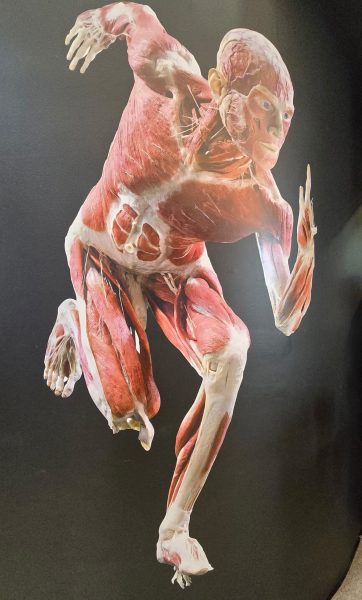Everything Everywhere All At Once: A lesson on living life without regrets
Everything Everywhere All At Once is sci-fi multiversal acid trip, which would have benefited from an epilepsy warning, challenges Asian family dynamics and tells a very human story.
Spoiler Alert: This review contains spoilers for Everything Everywhere All At Once. However, the plot is so hard to explain that these spoilers probably don’t even matter.
When I walked into the movie theater, I didn’t expect hot dog fingers to bless the silver screen. I was equally surprised by a raccoon-Ratatouille parody and sentient rocks with googly eyes, but it is through these absurd elements that Everything Everywhere All At Once is able to connect with viewers. This sci-fi multiversal acid trip, which would have benefited from an epilepsy warning, challenges Asian family dynamics and tells a very human story. And as a senior in high school, it has provided me with a framework for managing regret.
The movie begins as a realistic character study. Evelyn Wang (Michelle Yeoh) is an overworked laundromat owner who runs the business with her husband Waymond (Ke Huy Quan). She has a tenuous relationship with her daughter, Joy (Stephanie Hsu), and the happy-go-lucky Waymond is contemplating a divorce. Evelyn’s father, strict Gong Gong (James Hong) is visiting from China at a time when the laundromat is being audited by the IRS. In short, Evelyn’s life is a taxing cyclone of stress.
Things take a turn when Waymond’s body is taken over by Alpha Waymond, a version of himself from a universe that discovered the multiverse. After explaining that multiverses are created by branching decisions, Alpha Waymond enlists the help of Evelyn to stop Jobu Tupaki, a being threatening to destroy everything. It is later revealed that Jobu Tupaki is Alpha Joy, who was pushed past the breaking point by Alpha Evelyn and now has unlimited power.
Evelyn’s foray into this new, mind blowing reality makes her understandably rethink the world around her. Alpha Waymond teaches how to verse-jump, or travel between universes. In order to do so, one must perform a statistically improbable action, such as stapling a piece of paper to one’s forehead or shoving a trophy up one’s you-know-where. These situations provide a humorous backdrop for the more serious themes the movie touches upon, as do the variety of Evelyns from different universes (e.g. the hot dog fingered people referenced earlier).
Evelyn is able to learn complex verse-jumping techniques at a remarkable pace, which Alpha Waymond says is because this version of Evelyn is the culmination of every single wrong decision and thus is the most malleable. While this is played for laughs, it speaks to the heart of Evelyn’s character and her regrets in life. She disappointed her parents by leaving China with Waymond, she is swimming upstream in a struggling laundromat, and she can barely even stand the man she made her vows with. Through verse-jumping, Evelyn gets an insight into what her life could have been. Had she not fled home with Waymond, she could have become a famous martial arts movie star. Although Evelyn has spent a long time daydreaming about her past choices, this forces her to confront them head on.
While Jobu Tupaki was created from Alpha Evelyn’s overbearingness, this mother-daughter relationship reflects the one between Evelyn and Joy. Unhappy with her life, Evelyn has tried to guide Joy down a path that fixes her own mistakes. And while Evelyn meets the bare minimum in not outright disowning Joy for having a girlfriend, Evelyn’s refusal to introduce Joy’s girlfriend as a romantic partner to Gong Gong only further divides the two.
As Jobu Tupaki verse-jumps between Alpha Joy and Joy, Evelyn’s powers begin to grow. Jobu Tupaki’s destructive purposes appear to be set on killing the mother who caused her so much anguish, but in a heartbreaking admission, Jobu Tupaki reveals that she is just trying to find someone who can relate to her. Once Evelyn levels up to Jobu Tupaki’s reality-bending power set, Jobu Tupaki hopes that her mother will understand her point of view: everything is meaningless. Both of them can create anything and be anywhere all at once, so what’s the point of existing?
Jobu Tupaki’s nihilism is rooted in immortality and omnipotence, but it is also very relatable. In the grand scheme of things, we are all going to die. It can be hard to care when it feels like the end result will be the same. This attitude is the opposite of Evelyn’s regret, as Evelyn cares too much while Jobu Tupaki cares too little. Sadly, Jobu Tupaki has been struggling with these thoughts for so long that they have led to suicidal idealization. She has created a black hole-like bagel to destroy everything in the world, including herself, so that there will finally be an end.
Through a climatic flickering between different universes, Jobu Tupaki tries to persuade Evelyn that destroying the world will be the only way to find peace. As Evelyn travels through the disappointments of her different selves—failed relationships, the audited laundromat, and Waymond’s divorce papers—she becomes increasingly convinced. A life trying to fight all her problems has left her exhausted. However, just as she is about to give in, her will to live is revived by one of the universe’s Waymonds. Despite their failing business and imminent divorce, Waymond is able to convince the IRS auditor to give them a little more time. Evelyn finally realizes that she shouldn’t belittle Waymond’s jovial nature. Waymond’s relentless optimism, while at times unrealistic, has been a powerful coping mechanism that she can learn from. Her pragmatism isn’t always the solution, and in order to save her daughter (and the world), she decides to take a page out of her husband’s handbook.
The change of heart allows Evelyn to save Jobu Tupaki. Despite their differences, Evelyn, Waymond, and Gong Gong create a chain to prevent Jobu Tupaki from being swallowed by the bagel. This doesn’t magically fix their lives, but it helps Evelyn reevaluate the relationships in her life. She starts showing more affection towards Waymond instead of putting down his every move. She starts making the steps to understand Joy as a multifaceted individual. Her life may not have turned out as she planned, but it’s not over yet. As long as she is alive, she can still choose to make decisions that lead to happiness for herself and others.
As a senior, my life is (hopefully) far from over. However, to the teenage brain, every tiny mistake is magnified. I definitely have my regrets from high school, from sacrificing sleep to isolating myself during the pandemic, but this movie taught me that I shouldn’t dwell on them. I shouldn’t stop caring altogether either. Instead, I should accept my past decisions and work toward bettering my future. Perhaps this message is trite, but it’s one that many seniors need right now.
Despite the absurd visuals and hilarious antics, Everything Everywhere All At Once wants to show its viewers how to live life to the fullest. It’s about trading the instinct to fight for kindness, and never losing sight of the beautiful possibilities that life gives. Realistically, the family’s tax audits aren’t automatically solved, and the rebuilt relationships are still very fragile. However, if the black-hole bagel proves anything, this film is anything but realistic. Hope is the thing with feathers, and in this day and age, clinging onto it takes strength. After these past few years, this movie’s message of unrelenting hope might just be what we need to keep going.
Your donation will support the student journalists of Carnegie Vanguard High School. Your contribution will allow us to cover our annual website hosting costs and fund field trips, competition fees, and equipment. We appreciate your support!

Hi, I'm Jessica! I am a senior and one of the Feature Editors for Upstream News. I love dance, Marvel, and cats.







Jessica Lin • Apr 22, 2022 at 12:09 pm
Great article Jessica. It was really thoughtful and a good read.
Brooke Ferrell • Apr 19, 2022 at 2:02 pm
What a gorgeous review! You beautifully tie your own insights in between descriptions of the plot itself and it’s really a masterclass in how to write a review. This was really fun to read!